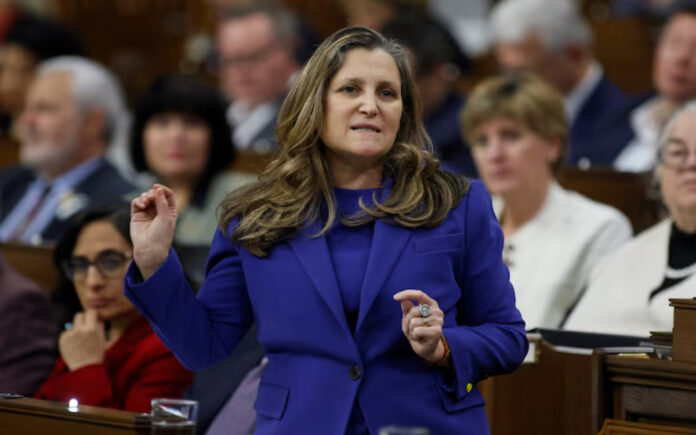Ottawa: Canada’s Finance Minister, Chrystia Freeland, resigned on Monday following a disagreement with Prime Minister Justin Trudeau over key policy decisions, including handling potential U.S. tariffs. Her departure marks a significant setback for an already struggling Liberal government.
In a pointed resignation letter, Freeland criticized Trudeau’s advocacy for increased spending, labeling it a political maneuver that could undermine Canada’s ability to respond to U.S. President-elect Donald Trump’s proposed 25% import tariffs.
“The government of Canada is itself spiraling out of control,” said Conservative leader Pierre Poilievre, calling for an immediate election. “We cannot accept this kind of chaos, division, and weakness while staring down the barrel of a 25% tariff from our biggest trading partner.”
Tensions With Trudeau
Freeland’s resignation follows a Friday meeting where Trudeau proposed a reduced role for her in the Cabinet. A Liberal insider revealed that Trudeau suggested Freeland take a symbolic position as minister without portfolio, focusing on Canada-U.S. relations—a demotion that underscored their ongoing disputes.
Freeland, who also served as Deputy Prime Minister, noted in her resignation letter: “For the last number of weeks, you and I have found ourselves at odds over the best path forward for Canada.” She argued that fiscal restraint was essential to prepare for potential economic challenges, adding, “That means eschewing costly political gimmicks, which we can ill afford.”
Her departure comes as Trudeau’s government faces mounting criticism over its economic management and struggles with declining approval ratings.
Leadership Crisis Looms
Freeland’s resignation occurred just hours before she was scheduled to present the fall economic update, which was expected to reveal a significantly larger budget deficit for 2023/24 than previously forecast. Political analysts predict her exit could deepen the leadership crisis within the Liberal Party.
“This will likely trigger a leadership crisis within the Liberal caucus,” said Nik Nanos, founder of Nanos Research. “It is politically and personally devastating for Trudeau.”
Public opinion polls suggest the Liberals are at risk of losing the next election, which must take place by October 2025, to the opposition Conservatives. Trudeau’s government has relied on support from the New Democratic Party (NDP) to maintain power, but NDP leader Jagmeet Singh has not clarified whether this arrangement will continue following Freeland’s resignation.
Economic and Political Fallout
Freeland’s resignation comes amid economic uncertainty, with Canada’s 10-year bond yields reaching their highest levels since late November. The Canadian dollar initially dropped to a four-and-a-half-year low before recovering slightly. Domestic media reported that Freeland and Trudeau had clashed over temporary tax breaks and other spending measures proposed by the government.
Freeland’s leadership was instrumental during previous crises, particularly in renegotiating the trilateral free trade agreement with the U.S. and Mexico in 2017, following threats by then-President Trump to withdraw. However, her resignation letter highlighted her diminishing confidence in the current administration: “On Friday, you told me you no longer want me to serve as your Finance Minister and offered me another position in the Cabinet… I have concluded that the only honest and viable path is for me to resign.”
Also Read | Mayotte Battles Aftermath of Cyclone Chido: Worst Storm in 90 Years
Broader Cabinet Resignations
Freeland’s resignation coincided with Housing Minister Sean Fraser’s announcement that he was stepping down for family reasons. This follows six other ministers who have either resigned or declared they will not run in the next election. The growing list of departures signals deeper unrest within Trudeau’s government.
Among potential successors to Freeland is Mark Carney, former Governor of the Bank of Canada, who currently serves as an economic advisor to Trudeau. However, Carney is not a sitting legislator, and tradition dictates he would need to secure a seat in the House of Commons to assume the role.
Future Implications
Freeland’s resignation underscores a turbulent period for Trudeau’s administration, with divisions over economic policies and political strategies threatening its stability. The fallout from her departure will likely shape Canada’s political landscape in the months to come.



